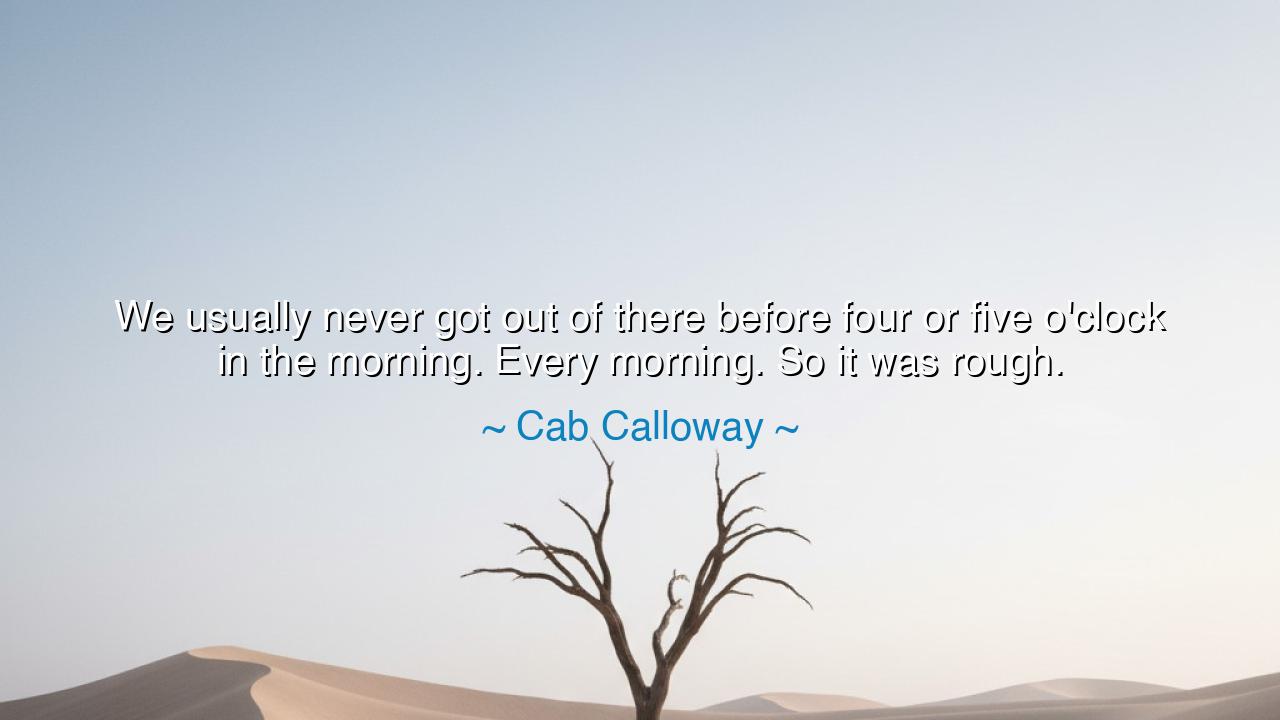
We usually never got out of there before four or five o'clock in
We usually never got out of there before four or five o'clock in the morning. Every morning. So it was rough.






"We usually never got out of there before four or five o'clock in the morning. Every morning. So it was rough." These words from Cab Calloway paint a vivid picture of the relentless dedication and sacrifice that artists, musicians, and creators often face in their pursuit of greatness. Calloway’s reflection speaks not only to the exhaustion of long hours spent in performance and practice, but to the passion that fuels such a life. The late nights, the fatigue, the toll on one’s body and spirit—these are the hidden costs of creativity and success that many do not see. Yet, these struggles, these sacrifices, are the very foundation of what makes artistic achievement possible.
In the ancient world, such dedication was not uncommon among those who sought to master their crafts. The Greek philosophers spent countless hours in discussion, often well into the night, seeking truth and understanding. Plato, in his dialogues, would often engage in deep conversations that stretched for hours, their minds alight with the pursuit of knowledge. But these philosophers, too, paid a price for their dedication—often at the cost of their health, their wealth, and their personal time. Aristotle famously spent long hours at his Lyceum, teaching and refining his thoughts on everything from ethics to biology. In the pursuit of mastery, the ancient scholars understood that the price of greatness is often paid in long, wearying hours that leave little room for rest.
The story of Hercules—the great hero of Greek mythology—also illustrates the same sacrifice for achievement. Hercules was tasked with the Twelve Labors, each more difficult than the last, demanding not only immense physical strength but also incredible mental perseverance. His labors were grueling, requiring him to face the seemingly impossible, yet he never shied away from the challenge. He faced his trials not just with bravery but with the understanding that the path to greatness is never easy. Calloway’s words echo this ancient understanding: true greatness is often earned through struggle, through the willingness to endure hardships in pursuit of a greater goal.
Cab Calloway’s life, much like that of Hercules or the great philosophers, was not one of ease. The jazz musician’s late nights, spent creating and performing, were his own labors, his own form of artistic discipline. But just as Hercules understood that greatness required effort, Calloway knew that art demands not just talent but the sacrifice of time, energy, and often personal comfort. The long hours were not merely a burden to him—they were a rite of passage, a necessary step in honing his craft and leaving behind a legacy of music that would continue to resonate long after his time.
In the same way, consider the story of Beethoven, whose dedication to music often pushed him to extremes. Though deaf, Beethoven composed symphonies that would become pillars of classical music. He worked tirelessly, often staying up through the night, driven by a force greater than the world around him. His was a life marked by personal sacrifice and mental anguish, but his symphonies stand as monuments to the belief that greatness is achieved not by avoiding hardship, but by embracing it with courage and determination.
The lesson we can draw from Calloway and these other great figures is that the path to mastery is paved with both hard work and sacrifice. It is not enough to simply have talent; one must be willing to endure the long, often grueling hours required to shape that talent into something exceptional. Every artist, every thinker, every creator must be willing to give everything—to push through the fatigue, to work into the early hours, and to pay the price for greatness.
In practical terms, this means we must learn to embrace the grind, to honor the long, tiring hours that will eventually lead to the fulfillment of our goals. Whether we are pursuing art, science, or personal growth, the lesson is clear: success is earned through dedication, and that dedication often requires us to give up comfort for a greater cause. Just as Cab Calloway and Beethoven sacrificed sleep for their art, so must we be willing to sacrifice for the things that truly matter to us. The struggles are not obstacles—they are part of the journey, and through them, we find the strength and wisdom to create something that will endure.






AAdministratorAdministrator
Welcome, honored guests. Please leave a comment, we will respond soon